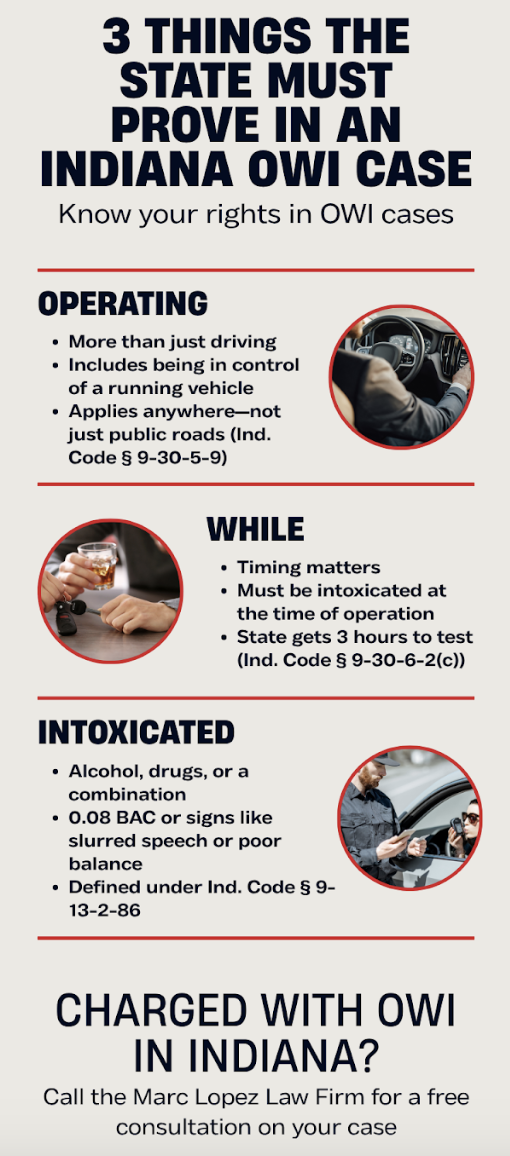In Indiana, the legal term for drunk driving is OWI, or Operating While Intoxicated. Many people say “DUI” or “OVWI,” but if you’re charged, your paperwork will read “OWI.”
If you’ve been arrested, it may feel like the damage is already done. It’s not. The State still has to prove three specific elements, and if they miss on even one, the case can fall apart.
At the Marc Lopez Law Firm, we handle these cases every day. Let’s walk through what the law actually requires and why the details matter more than most people realize.
The Basics: What Is an OWI?
OWI stands for Operating While Intoxicated, and the charge is defined under Indiana Code § 9-30-5-2, which states:
“A person who operates a vehicle while intoxicated commits a Class C misdemeanor.”
Every OWI case comes down to three elements:
- Operating a vehicle
- While
- Intoxicated
The State has to prove each one beyond a reasonable doubt. Miss one? No conviction.

1. Operating: More Than Just Driving
People assume you have to be caught driving to get charged with OWI. Not true.
In Indiana, “operating” means more than just moving down the highway. It means being in actual physical control of a vehicle that’s capable of being driven. If you’re in the driver’s seat, key in the ignition, and the engine is running, that likely counts even if the car isn’t moving.
In Winters v. State, 132 N.E.3d 46 (Ind. Ct. App. 2019), the defendant was asleep at the wheel of a running vehicle that was parked halfway in a driveway and halfway in the road. The Court held that this still qualified as operation under the law.
And if you think you’re safe because you weren’t on a public road, think again. Indiana Code § 9-30-5-9 says:
“It is not a defense in an action under this chapter that the accused person was operating a vehicle in a place other than on a highway.”
Whether you’re in a parking lot, private drive, or side alley, it doesn’t matter. If you’re in control of a working vehicle, it may be enough to satisfy the State’s first element.
That’s why it’s important to look at where you were, what condition the vehicle was in, and what exactly you were doing when officers showed up. Details like whether the vehicle could actually move aren’t just technicalities, they’re potential defenses.
2. While: Timing Is Everything
The next element the State has to prove is that you were intoxicated at the same time you were operating the vehicle.
Too many people—including some attorneys—ignore this part. But the courts don’t.
If you’re found intoxicated after the fact, that’s not enough. The law requires a nexus, or a direct connection, between your intoxication and your operation of the vehicle. In other words, being drunk now doesn’t mean you were drunk then.
This is especially important in accident cases or when police find you outside the car. If you’ve left the scene or if too much time has passed, the State may struggle to prove that crucial timing link.
Indiana law gives the State some breathing room here. Indiana Code § 9-30-6-2(c) allows officers to administer a chemical test within three hours of developing probable cause. If that test comes back over the legal limit, the State can argue that intoxication and operation overlapped.
But when that test is delayed, or when there’s no test at all, that timing issue becomes a weak spot. And that’s where an experienced OWI attorney can go to work.
3. Intoxicated: Alcohol, Drugs, or Both
Most people think OWI only applies to alcohol, but Indiana law is much broader.
Under Indiana Code § 9-13-2-86, intoxication means being under the influence of:
“(1) alcohol;
(2) a controlled substance…
(3) a drug other than alcohol or a controlled substance;
(4) a combination…
so that there is an impaired condition of thought and action and the loss of normal control of a person’s faculties.”
You don’t need to be falling-down drunk. If a substance impairs your ability to think clearly or control your actions, that qualifies.
There are two main ways the State tries to prove intoxication:
1. Test Results
If you blow a 0.08 or higher, the State gets a presumption of intoxication. According to Indiana Code § 9-30-5-1:
“A person who operates a vehicle with an alcohol concentration equivalent to at least 0.08 gram… commits a Class C misdemeanor.”
If your result is 0.15 or higher, the charge becomes a Class A misdemeanor.
The State can also charge you for having Schedule I or II drugs (or their metabolites) in your system, even if you weren’t impaired. However, under § 9-30-5-1(d), you may have a defense if the drug was taken as prescribed by a licensed practitioner.
2. Behavioral Signs
When no test is available, the State may rely on what the officer saw. This includes:
- Slurred speech
- Poor balance
- Odor of alcohol
- Failed field sobriety tests
- Bloodshot eyes or erratic behavior
This sort of evidence may sound convincing, but it’s not always reliable. These signs can also be caused by fatigue, medical conditions, or anxiety.
And let’s be honest, officers are trained to say you looked impaired. That doesn’t mean it’s true. A good defense attorney will challenge every assumption.
OWI Charges Are Serious
Even a first-time OWI is no joke. It starts as a Class C misdemeanor, but that can change fast:
- Add endangerment (like bad driving or an accident), and you’re looking at a Class A misdemeanor
- A prior OWI within 7 years, or having a child in the car, bumps it up to a Level 6 felony
- Serious injury or death? The charges go even higher
A conviction can mean jail time, license suspension, fines, and a permanent criminal record. That’s why it’s critical to get legal help right away.
Make the Right Call
Indiana’s OWI law is more complex than most people realize. The State has to prove:
- You were operating a vehicle
- You were doing so while intoxicated
- And you were actually intoxicated
At the Marc Lopez Law Firm, we know how to challenge each of those elements. If the evidence doesn’t hold up, we don’t back down. We push hard for dismissals, reduced charges, or favorable outcomes that protect your future.
If you’re facing an OWI charge in Indiana, give us a call at 463-946-0521. Let’s talk about your case and your options.
And remember: Always plead the 5th.




